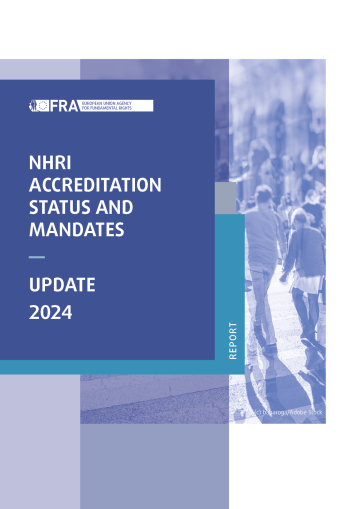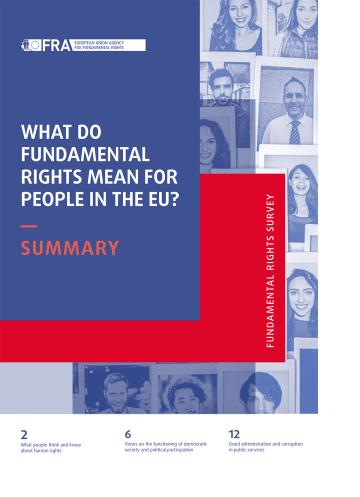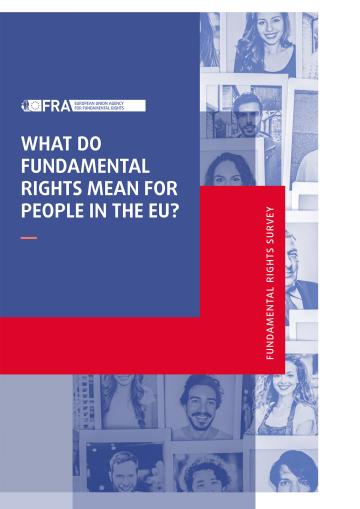The CPR 21–27 provides that a complaints mechanism should be in place that is capable of an “effective examination” of complaints. The type of complaint most relevant to fundamental rights and EU funds would be one in which a third party (e.g. an NGO or someone affected by a funded operation) would seek to complain about an operation being a violation of fundamental rights and to end (the funding of) that operation (or set of operations).
This section will discuss the various remedies available to such individuals or organisations. It will then explain the research findings on complaints mechanisms at national level to see what improvements might be needed in the current cycle and in the future. It will not cover situations in which a beneficiary seeks to appeal against a decision not to fund an operation.
Article 47 of the Charter provides that “[e]veryone whose rights and freedoms guaranteed by the law of the Union are violated has the right to an effective remedy before a tribunal”. This can be the EU’s own court, the Court of Justice of the European Union (CJEU) or the national courts.
FRA is not aware of cases successfully filed in national court seeking to block or cease funding for operations approved by national managing authorities. Filing a case before the CJEU to complain against funding-specific operations is not a promising avenue either, given that acts granting funding to operations will typically be acts of Member States, which cannot be reviewed by an action for annulment by the CJEU (Article 263 of the Treaty on the Functioning of the European Union). Instead, the CJEU can deal with requests to annul an act adopted by a European Union institution, body, office or organisation.
Moreover, the legal standing of individuals before the CJEU is limited. This was exemplified in a case in which NGOs dealing the rights of persons with disabilities requested the European Commission to suspend a call for proposals for the award of grants under the procedure ‘Support for the deinstitutionalisation of social services for elderly people and people with disabilities and all related payments’. In its letter, the Commission replied negatively to the appellants’ request to act. The NGO brought an action for a failure to act (under Article 265 of the Treaty on the Functioning of the European Union) before the General Court. The General Court dismissed the NGO’s action due to the lack of standing of the applicants to bring the case, essentially because they were not the beneficiaries of the funds in question (this was Bulgaria, the Court held), nor were they liable for the sums which would have to be recovered in the event of a decision by the Commission to suspend the payments. The applicants were thus not directly affected by the decision concerning the financial assistance granted by the European Social Fund and could not bring the case, as this requires the party bringing the case to be directly and individually affected by the contested measure [180]
Order of the General Court (Seventh Chamber), T-613/19, European Network on Independent Living Brussels Office (ENIL Brussels Office) and Others v. European Commission, 2 September 2020.
. This order by the General Court was confirmed in April 2021 by the CJEU [181]
CJEU, C-622/20 P, Validity Foundation – Mental Disability Advocacy Centre and Center for Independent Living Association v. European Commission, 15 April 2021.
.
It is possible for the Commission to file infringement procedures against Member States, including for violations of the Charter. An investigation by the Commission could be triggered if multiple complaints are submitted to the Commission regarding a systemic issue in a Member State in relation to the funds governed by the CPR [182]
Interview with European Commission official, 22 July 2022, p. 5; interview with European Commission official, 19 July 2022, pp. 7–8.
. However, it is up to the Commission, within the margin of its discretion as Guardian of the Treaties, whether it initiates such procedures. A recent study on infringement proceedings and conditionality in EU funding instruments in the context of external border management concluded that there appears to be no systematic use of the infringement procedure in the field of fundamental rights violations by Member States [183]
Rijpma, J. and Fotiadi, A. (2022), Addressing the violation of fundamental rights at the external borders of the European Union: Infringement proceedings and conditionality in EU funding instruments, Greens/EFA Parliamentary Group, Brussels, p. 18.
. The report notes that, although the Commission has an obligation to suspend or withdraw funding when a Member State is not complying with fundamental rights, “numerous reports of fundamental rights violations … did not lead to the suspension or withdrawal of funds” [184]
Rijpma, J. and Fotiadi, A. (2022), Addressing the violation of fundamental rights at the external borders of the European Union: Infringement proceedings and conditionality in EU funding instruments, Greens/EFA Parliamentary Group, Brussels, pp. 14–15.
.
In principle, two broad avenues remain open at EU level: a complaint to the Commission and the use of non-judicial remedies, discussed in the following sections.
Submitting a complaint to the Commission is always possible, regardless of whether a national complaint has been filed (Article 69 (7) of the CPR 21–27). This can be done through a form available on the Commission’s website [185]
European Commission, ‘How to make a complaint at EU level’.
. For example, the European Network on Independent Living has previously filed complaints concerning the use of funds from the European Agricultural Fund for Rural Development through this channel regarding the funding of institutions for persons with disabilities [186]
See, for example, ENIL (European Network on Independent Living) (2023), ‘ENIL and IL Austria complain to the European Commission’.
.
Interviewees also note the option of complaining to the Commission in its capacity as observer in the monitoring committee of a programme. This is done more frequently, and, for the Commission, complaints submitted at EU level can be helpful to spot problematic issues and start a dialogue with the managing authorities.
Two problems arise here, however. First, the Commission, after it receives a complaint, usually checks the validity of complaints directly with the national authorities only. This significantly reduces the information available to the Commission to examine the validity of the complaint. There could be a role for independent fundamental rights bodies here, which would be able to investigate the situation on the ground and inform the Commission of any violations in projects funded by the EU. A broader reporting system could be established so that the European Commission is informed on a more systematic basis of how fundamental rights were considered in the funding process [187]
For a proposal that was made in more general terms on how to use infringement procedures as a tool for the protection of fundamental rights within the EU, see de Schutter, O. (2017), Infringement proceedings as a tool for the enforcement of fundamental rights in the European Union, Open Society European Policy Institute, Brussels.
.
Perhaps a more important problem, however, is that appeals to the CJEU are not possible when the Commission rejects the complaint raised by the relevant individual or organisation, as explained previously. This is most visible in the case of the issue of independent living, with the UN body overseeing the CRPD, the Committee on the Rights of Persons with Disabilities, having explicitly called for an end to all funding of institutions for persons with disabilities [188]
UN Committee on the Rights of Persons with Disabilities (2015), Concluding observations on the initial report of the European Union , pp. 50–51.
. The UN Special Rapporteur on the Rights of Persons with Disabilities has described the difference of views between the EU and the CRPD experts in some detail [189]
Human Rights Council (2022), Report of the Special Rapporteur on the Rights of Persons with Disabilities, Gerard Quinn: Visit to the European Union, paras. 36–48.
. This means that, although it may be possible to convince the Commission to suspend funding, there is no viable route for CSOs or other fundamental rights actors to legally require it to do so.
Another route is to file a complaint with the European Ombudsman. While such complaints can only concern an EU institution (in the context of EU funds and the Commission), the European Ombudsman can engage national or regional ombudsperson institutions from the European Network of Ombudsmen, a network of 95 national and regional ombudsperson institutions and similar bodies in 36 European countries [190] European Network of Ombudsmen (n.d.), The European Network of Ombudsmen.
, and invite them to launch inquiries in parallel regarding the same issue but concerning national-level administration.
The European Ombudsman has conducted several own-initiative inquiries into matters related to the implementation of support from the funds mentioned in the CPR, for example relating to funding of institutions for persons with disabilities and/or older persons [191]
European Ombudsman (2021), ‘Ombudsman inquiry into the use of EU funds in relation to institutional care, against backdrop of COVID-19 pandemic’.
. These inquiries have resulted in reports with concrete recommendations for improvement to both the Commission and the Member States. Other inquiries conducted by the European Ombudsman regarding EU funds have concerned migration management facilities and border management. These inquiries have also resulted in recommendations on how to address existing fundamental rights concerns [192]
European Ombudsman (2023), ‘Decision in strategic inquiry OI/3/2022/MHZ on how the European Commission ensures respect for fundamental rights in EU-funded migration management facilities in Greece’; European Ombudsman (2022), ‘How the European Commission ensures that the Croatian authorities respect fundamental rights in the context of border management operations financed by EU funds’; European Ombudsman (2015), ‘Decision of the European Ombudsman closing her own-initiative inquiry OI/8/2014/AN concerning the European Commission’.
.
It is also possible to file a petition with the European Parliament’s Petitions Committee on a subject that falls under the EU’s fields of activity and that affects them directly [193]
Articles 20, 24 and 227 of the Treaty on the Functioning of the European Union; Article 44 of the Charter.
. For example, this was done by a disability NGO on the issue of EU funding for institutions for persons with disabilities in 2021 [194]
ENIL (2021), ‘Support ENIL’s petition to demand closure of institutions!’
. The right to file a petition with the European Parliament, as outlined in Article 44 of the Charter, allows every individual resident in the EU to address the Parliament through its Petitions Committee, which conducts investigations and looks into how EU law is implemented. The Petitions Committee may also ask the European Commission to conduct a preliminary investigation on a petition and provide information regarding compliance with relevant EU legislation or take any other action considered appropriate to try to resolve an issue. However, a petition does not lead to a binding decision on the issue under complaint.
It is also possible to complain to the European Anti-Fraud Office in some cases. The European Anti-Fraud Office deals with EU expenditure fraud, including wrongful payment of EU funds, non-disclosure of required information with the same effect or any misuse of funds for purposes other than those for which they were originally granted. A violation of fundamental rights may be seen as an irregularity, that is to say, “any infringement of a provision of Community law resulting from an act or omission by an economic operator, which has, or would have, the effect of prejudicing the general budget of the Communities […] by an unjustified item of expenditure” [195]
See Article 1(2) of Council Regulation (EC, Euratom) No 2988/95 of 18 December 1995 on the protection of the European Communities financial interests (OJ L 312, 23.12.1995, p. 1). See also European Anti-Fraud Office, ‘Report fraud’.
. If an irregularity is committed deliberately, it constitutes fraud. In some cases, allegations of fraud can be taken up by the European Public Prosecutor’s Office [196] This includes cross-border VAT fraud involving total damages of at least EUR 10,000,000; other types of fraud affecting the EU’s financial interests; corruption that damages, or is likely to damage, the EU’s financial interests; misappropriation of EU funds or assets by a public official; money laundering and organised crime, as well as other offences inextricably linked to one of the previous categories. See European Public Prosecutor’s Office, Mission and Tasks; Article 22 of Council Regulation (EU) 2017/1939 of 12 October 2017 implementing enhanced cooperation on the establishment of the European Public Prosecutor’s Office (‘the EPPO’) OJ L 283, 31.10.2017, p. 1–71 and titles II & III of the PIF Directive (Directive (EU) 2017/1371 of the European Parliament and of the Council of 5 July 2017 on the fight against fraud to the Union's financial interests by means of criminal law, OJ L 198, 28.7.2017, p. 29–41).
.
Finally, complaints mechanisms at international level can also be used. Individuals can file complaints under the Optional Protocol to the CRPD if the Member State in question has ratified it [197]
CRPD, Optional Protocol, Art. 1.
. The Committee on the Rights of Persons with Disabilities can also commence inquiries if it has received reliable evidence of grave or systematic violations of CRPD provisions [198]
CRPD, Optional Protocol, Art. 6.
. This latter procedure was used in Hungary, where the committee found grave and systemic violations in the context of institutionalisation of persons with disabilities, including through the use of EU funds [199]
UN Committee on the Rights of Persons with Disabilities (2020), Inquiry concerning Hungary under article 6 of the Optional Protocol to the Convention.
. Regarding EU funds in particular, it found that “public funds, including funding from the European structural and investment funds, continue to be invested in building, renovating and expanding large- and small-scale institutions, thus removing resources for support for independent living and the development of accessible, community-based services that foster inclusion” [200]
UN Committee on the Rights of Persons with Disabilities (2020), Inquiry concerning Hungary under article 6 of the Optional Protocol to the Convention, para. 101 (g).
.
However, the EU itself has not ratified the Optional Protocol to the CRPD. Therefore, the Committee on the Rights of Persons with Disabilities is not mandated to receive and consider communications from or on behalf of individuals or groups of individuals claiming to be victims of a violation by the EU. Moreover, the Committee cannot conduct an inquiry according to Article 6 of the Optional Protocol. At the same time, even without ratification of the Optional Protocol, the CRPD Committee can comment on national practices, including the funding of institutions for persons with disabilities, in the regular reporting procedure foreseen by the Convention or under Article 6 CRPD as described above.
A final option is national complaints, which, as noted previously, should allow for an “effective examination” in accordance with Article 69 (7) of the CPR 21–27. Under the horizontal enabling condition on effective application and implementation of the Charter and the CRPD, Member States need to have reporting arrangements to the monitoring committee regarding cases of non-compliance of operations supported by the funds and regarding complaints concerning the funds linked to the Charter or the CRPD submitted in accordance with the arrangements made pursuant to Article 69 (7) of the CPR 21–27, Annex III. This means that Member States must also ensure that fundamental rights-related complaints can be submitted.
The level of publicity associated with complaints mechanisms on EU funds is historically not high [201]
Polverari, L. and Michie, R. (2017), ‘Dealing with unhappy customers: How do Member States handle complaints under the ESI Funds?’, European Structural and Investment Funds Journal, Vol. 4, p. 308.
. FRA research appears to confirm this, as the issue most frequently cited in relation to the previous programming period by research participants was a lack of awareness about existing complaints mechanisms.
For example, in Finland, various research participants representing independent fundamental rights bodies, CSOs and national fund managers mention a lack of familiarity with the complaints mechanisms for fundamental rights concerns in the context of EU funds [202]
Franet country report - Finland, 2023, p. 21.
.
Croatian research participants highlight the same issue. In Croatia, complaints can be submitted to, among others, the national ombudsperson institutions. However, as the Croatian NHRI notes in its report, the public is not always aware that these are the institutions with which complaints can be filed [203]
Ombudsperson of the Republic of Croatia (2023), ‘The role of national bodies with a human rights remit in ensuring fundamental rights compliance of EU funds’, report written in the framework of the FRA project “Supporting National Human Rights Institutions in monitoring fundamental rights and the fundamental rights aspects of the rule of law” (not yet publicly available).
. A similar example in relation to the previous programming period can be cited from an interview conducted in Germany. In this case, a representative of a refugee rights NGO with 20 years’ experience who was serving on a monitoring committee was unable to identify how to complain against a decision in relation to the German AMIF [204]
Interview with a German civil society representative, 6 August 2022.
.
The recent policy note by PICUM and ECRE also highlights the lack of awareness about complaints mechanisms [205]
PICUM and ECRE (2023), Fundamental rights compliance of funding supporting migrants, asylum applicants and refugees inside the European Union, policy note, Brussels, p. 6.
. Their survey of 59 CSO respondents, carried out in January 2023, shows that CSOs working in the field of migration and asylum at national level are unaware of any formal avenue to report fundamental rights concerns or submit complaints regarding EU-funded operations. The policy note concludes that, although it is an obligation to set up such complaints mechanisms, it seems that information about them does not reach the public.
In Bulgaria, research shows that the lack of knowledge concerning which body should be addressed for which issue led to a great deal of time lost in “forwarding correspondence” to determine the competent authority to deal with a particular complaint [206]
Interview with a Bulgarian national fund manager representative, 26 May 2022; Franet country report – Bulgaria, 2023, p. 18.
. In relation to the previous programming period, representatives of the French Defender of Rights themselves were unsure of whether they were mandated to deal with complaints related to the use of EU funds, noting that this could require further legal analysis [207]
Cf. French Organic Law No. 2011-333 on the Defender of Rights (Loi organique n° 2011-333 relative au Défenseur des droits); Franet country report – France, 2023, pp. 13–14.
. In some cases, for example in Bulgaria and Poland, research respondents point out that the number of fundamental rights complaints related to EU funds is very low. Local and regional body representatives in Bulgaria see this as a positive sign [208]
Franet country report – Bulgaria, 2023, p. 15.
, whereas a representative of civil society suspects that it rather shows lack of awareness of complaint mechanisms or the Charter [209]
Interview with a Bulgarian civil society representative, 19 April 2022; Bulgaria roundtable report, p. 3; Polish Commissioner for Human Rights (2023), ‘The role of national bodies with a human rights remit in ensuring fundamental rights compliance of EU funds’, report written in the framework of the FRA project “Supporting National Human Rights Institutions in monitoring fundamental rights and the fundamental rights aspects of the rule of law” (not yet publicly available).
.
The situation is similar regarding publicity of the Charter arrangements to be set up under the CPR 21–27. When it comes to the horizontal enabling conditions, Member States are obliged to communicate the arrangements set up to the European Commission in so-called ‘self-assessments’. PICUM and ECRE note that it is a missed opportunity that the same information is not publicised more widely. They suggest that these assessments be made public to ensure that the information becomes available to those monitoring fundamental rights. They state in their policy note: “The lack of transparency on the content and outcome of the EC [European Commission] and MS [Member State] assessments undermines the accountability of the process at national level, where access to information remains a major challenge” [210]
PICUM and ECRE (2023), Fundamental rights compliance of funding supporting migrants, asylum applicants and refugees inside the European Union, policy note, Brussels, p. 6.
.
Another issue that has emerged in the research is a lack of expertise on fundamental rights issues of the designated complaints mechanisms. National fund managers may be inexperienced in dealing with these types of complaints, particularly at regional level [211]
Franet country report – Greece, 2023, p. 42.
. National complaints mechanisms are also sometimes more suited to complaints of fraud, which are more common in the context of EU funds than complaints about fundamental rights violations. For example, the Greek authorities refer to the National Transparency Authority as a body competent to receive complaints about the Charter. However, CSOs have expressed concerns about its expertise in this area [212]
Amnesty International (2023), ‘Joint NGO statement: No monitoring of fundamental rights violations in Greece without independent and effective mechanisms’.
as has the European Parliament’s Committee on Civil Liberties, Justice and Home Affairs [213]
European Parliament (2023), ‘MEPs concerned by threats to EU values in Greece’, noting that the National Transparency Authority “does not seem to be effective and concerns have been raised about its independence”.
and the UN Special Rapporteur on Human Rights Defenders, who notes that “[w]hile the National Transparency Authority has made some welcome contributions in the fight against corruption, it is not equipped to conduct independent investigations into the management of migration flows” [214]
UN Special Rapporteur on Human Rights Defenders (2022), ‘Statement on preliminary observations and recommendations following official visit to Greece’.
.
Many independent fundamental rights bodies are mandated to deal with individual complaints. However, research shows that their decisions may not be effectively implemented. In some Member States, research participants note that these bodies cannot issue binding decisions and in general lack the capacity to follow up on the implementation of their recommendations [215]
Franet country report – Bulgaria, 2023, p. 18.
.
CSOs note that a potential threat to a fair and efficient complaint procedure is a lack of protection for small and independent organisations, which might feel that their own requests for EU funding might be rejected if they file fundamental rights complaints against decisions to fund particular operations [216]
PICUM and ECRE (2023), Fundamental rights compliance of funding supporting migrants, asylum applicants and refugees inside the European Union, policy note, Brussels.
. Such retaliation for earlier complaints could motivate a new complaint alleging such retaliation.
Moreover, the lack of independence can be an issue. The CPR 21–27 requires Member States to set up effective complaints mechanisms. While independence is not explicitly required by the CPR 21–27, EU law and practice underline independence as a key element underpinning the effectiveness of complaints mechanisms [217]
Commission Recommendation (EU) 2018/951 of 22 June 2018 on standards for equality bodies (OJ L 167, 4.7.2018, p. 28), Art. 1.2.
. International human rights monitoring bodies have highlighted in other contexts the importance of independence or impartiality of the officials dealing with complaints [218]
CPT (European Committee for the Prevention of Torture and Inhuman or Degrading Treatment or Punishment) (2018), Complaints mechanisms, 27th General Report of the CPT.
. Concern over the lack of institutional independence of complaints mechanisms is highlighted as a potential issue, for example as regards the proposed arrangement in Poland [219]
Polish Commissioner for Human Rights (2023), ‘The role of national bodies with a human rights remit in ensuring fundamental rights compliance of EU funds’, report written in the framework of the FRA project “Supporting National Human Rights Institutions in monitoring fundamental rights and the fundamental rights aspects of the rule of law” (not yet publicly available).
.














